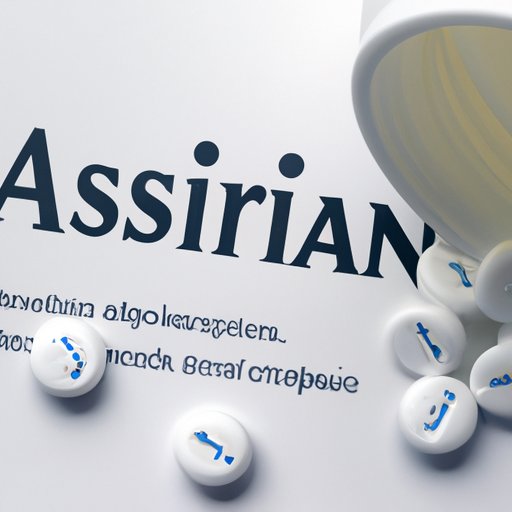
Introduction
If you suffer from pain, fever or inflammation, you may have found that you often need to take some form of pain relief medication. Two commonly used over-the-counter options are aspirin and Tylenol. But what happens when you need both drugs for maximum relief? Are they safe to take together? In this article, we will explore the topic of taking aspirin and Tylenol concomitantly and provide some guidance on how to do so safely.
Comparing the Differences Between Aspirin and Tylenol: Can They Be Taken Together?
Both aspirin and Tylenol are pain-relieving drugs that are available without a prescription. Aspirin, also known as acetylsalicylic acid, is a nonsteroidal anti-inflammatory drug (NSAID) that has been used to treat pain, fever, and inflammation for over a century. Tylenol, or acetaminophen, is classified as an analgesic, specifically a pain reliever and fever reducer.
Aspirin and Tylenol also work differently in the body. Aspirin inhibits the production of prostaglandins, which are chemicals produced by the body in response to injury or inflammation, resulting in pain relief and a reduction in inflammation and fever. In comparison, Tylenol affects an area of the brain that is responsible for regulating pain and fever.
The Potential Risks and Benefits of Taking Aspirin and Tylenol Together
While there can be benefits to taking aspirin and Tylenol together, there are also potential risks that should be considered. One benefit is that combining the two drugs may provide more effective pain relief than taking them alone, as they work in different ways.
However, taking aspirin and Tylenol together can also increase the risk of side effects such as gastric bleeding, liver damage, and kidney damage. Taking large amounts of Tylenol can be particularly harmful to the liver. It is especially important for those with preexisting medical conditions or those taking other medications to consult their doctor before taking aspirin and Tylenol together.
Navigating the Use of Aspirin and Tylenol Simultaneously: A Guide for Safe Consumption
If you need to take both aspirin and Tylenol simultaneously, there are several tips you can follow to minimize risks and ensure safe consumption. First, talk to your doctor about whether taking both drugs together is safe for you. Then, make sure to carefully follow recommended dosages for each drug, being aware of the total amount of acetaminophen you are taking if you are also taking Tylenol.
It’s essential to also avoid taking aspirin and Tylenol with alcohol, and try to take the drugs with food to reduce the risk of gastric irritation and stomach upset. Finally, if you experience any negative side effects, discontinue use, and seek medical attention immediately.
Understanding the Pharmacology of Aspirin and Tylenol: Can They Coexist Within Your Medication Regimen?
As we have already described, aspirin and Tylenol work differently on pain, fever, and inflammation. It is essential to be aware of the pharmacology of both drugs to understand how they can coexist within your medication regimen. The appropriate use depends on the specific condition that requires treatment and the patient’s age and medical history.
For example, aspirin should be avoided in children and teenagers because of the risk of Reye’s Syndrome. At the same time, Tylenol is generally not recommended in patients who already have liver disease. It’s important to be under the care of a doctor with any chronic medical conditions since they can ensure that your medication regimen is safe, effective and optimized for the specific condition.
Debunking the Myths and Misconceptions About Taking Aspirin and Tylenol Together
There are misconceptions floating around the use of aspirin and Tylenol together. One common belief is that taking both drugs together increases the risk of stomach or gastrointestinal bleeding. While it’s true that taking aspirin can cause bleeding and stomach upset, there is limited evidence that Tylenol increases the risk of gastrointestinal bleeding if taken with aspirin.
Another misconception is that these drugs can be taken together for any condition where pain relief is required. It’s important to remember that aspirin and Tylenol work differently. Tylenol is most effective in treating pain and reducing fever, whereas aspirin is an effective pain reliever, fever reducer, and anti-inflammatory.
Conclusion
Aspirin and Tylenol can be safe and effective when taken alone, but taking them together can increase the risk of side effects. The decision to take them together should always be discussed with your doctor. If you must take them together, follow recommended dosages carefully and be aware of the potential risks. Ultimately, always seek medical advice for safe and effective consumption of both drugs together.




